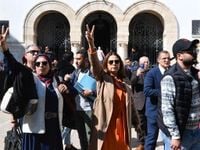On Saturday, April 19, 2025, a court in Tunisia delivered a devastating blow to the country's opposition, sentencing dozens of prominent figures to lengthy prison terms on national security charges. This mass trial, which has drawn sharp criticism from human rights advocates and sparked outrage among the defendants' supporters, saw sentences ranging from 13 to a staggering 66 years.
Among the 40 individuals sentenced were some of Tunisia's most senior opposition politicians, including a former justice minister and several diplomats. The sentences were reported by the TAP state news agency, which cited an unnamed judicial official. The defendants were found guilty of serious charges, including "conspiracy against state security" and "belonging to a terrorist group," with allegations of colluding with foreign powers to undermine President Kais Saied's regime.
The trial has been characterized by its unprecedented scale and the political motivations behind it. Critics argue that the charges are fabricated and serve as a tool for President Saied to stifle dissent and consolidate his grip on power. "President Saied has weaponised Tunisia’s judicial system to go after political opponents and dissidents, throwing people in arbitrary detention on flimsy evidence and pursuing them with abusive prosecutions," stated Bassam Khawaja, deputy Middle East and North Africa director at Human Rights Watch, in an interview with Al Jazeera.
Details surrounding the trial remain murky, particularly regarding the exact number of defendants and the specific charges they faced. Many of the accused, including the well-known French intellectual Bernard-Henri Levy, were sentenced in absentia, having fled Tunisia to avoid prosecution. Levy is accused of being a conduit between the defendants and foreign parties, a claim that has been widely criticized.
Defence lawyers vehemently condemned the trial, which they described as a "farce." On the evening of April 18, 2025, after the judge read the accusations, the deliberation began without hearing from either the prosecution or the defence. "In my entire life, I have never witnessed a trial like this. It’s a farce, the rulings are ready, and what is happening is scandalous and shameful," said lawyer Ahmed Souab.
The defendants include notable figures such as Issam Chebbi, Ghazi Chaouachi, Said Ferjani, and Jawhar Ben Mubarak, all of whom have been in custody since their detention in 2023. Chebbi, a member of the opposition National Salvation Front coalition, expressed his frustration, stating, "The authorities want to criminalise the opposition."
President Saied, who has faced accusations of authoritarianism since his power consolidation in 2021, has dismissed claims of dictatorship. He has previously labeled the accused politicians as "traitors and terrorists," warning that any judge who would acquit them would be considered an accomplice.
The backdrop to this mass trial is a broader narrative of repression that has unfolded since Saied's power grab. After dissolving the parliament and sacking the then-prime minister in 2021, Saied's regime has been marked by a significant rollback of freedoms, a sentiment echoed by rights advocates and opposition figures.
Kamel Jendoubi, a rights advocate and former minister tried in absentia, condemned the proceedings as a "judicial assassination" carried out by a court system that he claims serves a "paranoid autocrat." He asserted, "This is not a judiciary ruling, but a political decree executed by judges under orders, by complicit prosecutors and by a justice minister."
As the trial unfolded, defence lawyers called for all defendants to appear in court, highlighting that at least six had been on hunger strike in protest of their treatment. Despite the gravity of the accusations, many observers believe that the trial is more about silencing dissent than about upholding justice.
Human Rights Watch has emphasized that the trial is taking place amid a climate of repression, with Saied using the judicial system as a weapon against political opponents. Analyst Hatem Natfi noted that any acquittal in this mass trial would undermine the conspiratorial narrative that the regime has relied on since 2021, a narrative that has been largely accepted by the populace due to restricted media coverage.
The implications of this trial extend beyond the courtroom, as it raises serious questions about the future of democracy and political pluralism in Tunisia. With many opposition leaders already imprisoned and dissent being systematically crushed, the landscape for political discourse in the country appears increasingly bleak.
As Tunisia grapples with the fallout from this unprecedented trial, the international community watches closely, concerned about the erosion of human rights and the rule of law in a country that was once hailed as a beacon of democracy in the Arab world.
The situation remains fluid, with the possibility of further legal actions and appeals from the defendants. For now, the verdicts serve as a stark reminder of the challenges facing Tunisia's democracy and the lengths to which the current regime is willing to go to maintain control.




